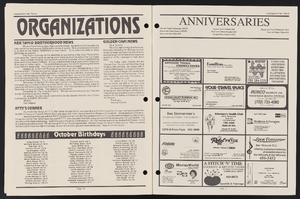Search the Special Collections and Archives Portal
Search Results

Transcript of interview with Sandra Peña by Lada Mead and Stefani Evans, March 27, 2017
Date
Archival Collection
Description
Sandra Peña’s story begins in East Los Angeles, where she spent her first fifteen years with her parents (both from Michoacán, Mexico), and her younger sister. The father's managerial position at Master Products allowed the family to live rent-free in a company-owned house behind the main factory, because he collected the rents for the company's two other dwellings. In this interview, Peña recalls the family move to Porterville, in California's Central Valley, her return to Los Angeles at nineteen, and her work with Parson’s Dillingham, a contractor for the Metrolink rail system. She draws the link between the Los Angeles and Las Vegas construction communities by describing her husband's move to Las Vegas to find work; a chance Las Vegas encounter with a friend from Chino, California; her ability to gain employment in Las Vegas at Parson’s, a company that had joint ventured with Parson’s Dillingham, and her move from there to Richardson Construction, a local minority-owned company. As Peña says, "It's kind of all intermingled. Even if you go here and you go there, it's like everybody knows everybody." Throughout, Peña weaves her family story into the narrative as she describes her youth, the birth of her son, the illness and death of her father, and her family's participation in her current employment with Richardson. As she remembers the people, places, and events of her life, Peña speaks to the ways one woman of color built on her interstate construction connections and rose in a male-dominated industry.
Text

Transcript of interview with Eleazar "Al" Martinez by Marcela Rodriguez-Campo, October 2, 2018
Date
Archival Collection
Description
In his lifetime, Eleazar Martinez has climbed both literal and figurative mountains as an avid outdoorsman and social justice advocate for Latinx issues. Born in Sweetwater, Texas, Eleazar (Al for short) grew up connected to the land and his family. Al comes from a large family with strong ties in Texas and Mexico. His mother worked the fields and his father was a construction worker who instilled in their children the importance of a strong work ethic and the pursuit of an education. Al shares about growing up during a time when Spanish was banned from schools and children would get punished if they were caught using their home languages. His experiences developed his aspiration to serve his community and fight for people’s rights. After a short stint in the Navy, Al followed his instincts and sought out a college education and majored in sociology. His interest in social issues lead him to serve in a range of roles from psychiatric support, community education outreach, and counseling. At one point, Al even helped mediate tensions between gangs and law enforcement in order to prevent violence from erupting. Since arriving in Las Vegas in 1998, Al has been working alongside diverse communities to build solidarity. Today, he works as a supervisor for the Whitney Recreation Center and leader in Hispanics Enjoying Camping, Hunting, and the Outdoors (HECHO). As Al would describe himself, he is “a proud Mexican Latino American, a Tejano with a Chicano attitude”.
Text

Transcript of interview with Vincent Kethen by Claytee White, December 23, 2009
Date
Archival Collection
Description
In 1964, the year that Vincent Kethen was born, desegregation of Las Vegas schools began. Like many African-American children living in the Las Vegas Westside neighborhood, Vincent was bused out of his neighborhood in third grade to attend a white school. In his case, this meant attending John S. Park Elementary and later other predominantly white schools. He talks about these experiences. John S. Park was a neighborhood of manicured lawns, while the school bus and the classroom were places fraught with fisticuffs. The experience of growing up during that era are recalled. Vincent provides a sense of that it was like to reside in his home neighborhood and the onslaught of the drug culture altered gang-lead neighborhoods. Being bused had positive results he explains, such as athletics, which served as an equalizer. For Vincent, a solid upbringing, which included love of church and the chance to attend college, encouraged him to make good decisions about his future. He received a four-year degree and he returned to Las Vegas to "give back." For over a decade and a half, her has coached young basketball players and helped them see their options for a brighter future than they might otherwise have seen.
Text
Southern Nevada Historical Society Photograph Collection on Basic Magnesium, Inc.
Identifier
Abstract
The Southern Nevada Historical Society Photograph Collection on Basic Magnesium, Inc. contains photographs of the construction of Basic Magnesium Inc.'s plants and buildings from 1941 to 1942. The photographs primarily depict aerial views of the plant site and various buildings, including the administration building, tent camp, chlorination buildings, electrolysis facilities, electrical distribution systems, and warehouses. The photographs also depict Lake Mead and the early buildings in Henderson, Nevada.
Archival Collection
John Wittwer Collection on Agriculture in Nevada
Identifier
Abstract
The John Wittwer Collection on Agriculture in Nevada (1898-1972) contains the professional papers and records of John Wittwer in his capacity as an Agricultural Extension agent for the University of Nevada from 1921 to 1954. The records are primarily annual reports containing text, photographs, newspaper clippings, and charts that provide a rich chronicle of the conditions of agriculture and ranching in southern Nevada from 1898 to 1972, with the bulk of the material dating from 1929 to 1955. These conditions span water issues, such as flood control and irrigation, to the general difficulties of sustaining agriculture and viable food production in a desert environment. The reports come from the Agricultural Experiment Stations in Clark and Lincoln counties and most contain both a statistical report and a narrative summary.
Archival Collection

Meeting minutes for Consolidated Student Senate, University of Nevada, Las Vegas, November 06, 1979
Date
Archival Collection
Description
Text

Gabriel Garcia oral history interview: transcript
Date
Archival Collection
Description
Oral history interview with Gabriel Garcia conducted by Monserrath Hernandez and Barbara Tabach on November 13, 2019 for the Latinx Voices of Southern Nevada Oral History Project. In this interview, Garcia discusses his early life in Arizona and moving to Las Vegas, Nevada in 1984. He remembers attending a sixth grade center, the Pacific Engineering and Production Company of Nevada (PEPCON) explosion, and attending Las Vegas High School. Garcia talks about Mexican culture in Las Vegas, car clubs, and becoming a graphic designer. Lastly, Garcia discusses his involvement with the Association of Latino Professionals for America, and the idea of diversifying the professional workplace.
Text



